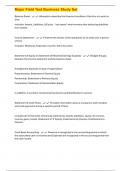Exam (elaborations)
Major Field Test Business Study Set
- Course
- Institution
Major Field Test Business Study Set Balance Sheet - -Attempts to describe the financial condition of the firm at a point in time. Includes: Assets, Liabilities, & Equity - "net assets" what remains after deducting liabilities from assets.. Income Statement - -Presents the results of the operat...
[Show more]



